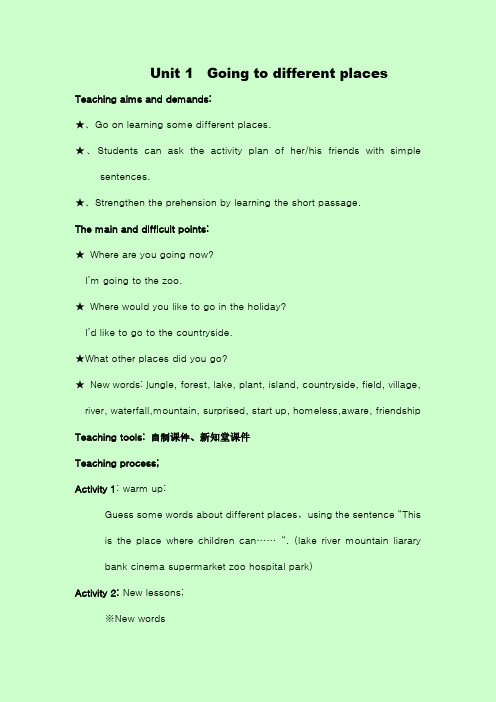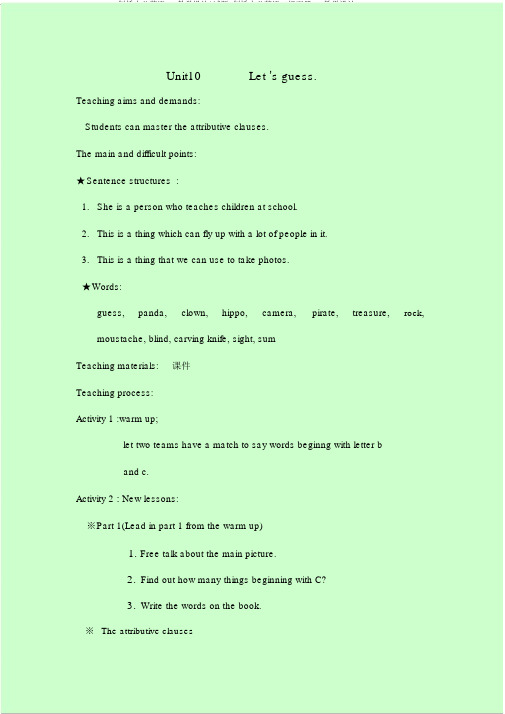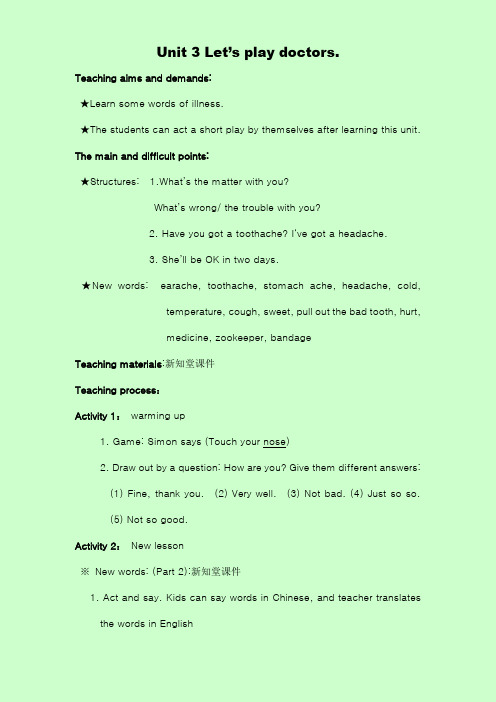剑桥少儿英语二级B册下册unit
- 格式:pptx
- 大小:4.60 MB
- 文档页数:55

Unit 12Animals are our good friends.Teaching aims and demands:Learn to talk about animals’appearance, habits hobbies and so on. The main and difficult points:Sentence structures:1.It is / It has/ It likes to/ It lives/ It is called/2.Do you know anything more about bats?New words: animal, friend, lizard, spider, parrot, bat, fly, country, China, England, Australia, useful, reddish, joey, pouch, hippo, move,truckTeaching materials:新知堂课件Teaching processActivity1:warm up1. Riddles: It's an animal. It's fat. It has a big nose. It sounds:“oink”.2.Say words of animals in a minute.3.Respond and spell as many words as they can.4.Look at Part 10. Try to say the wrong places with the structure: Thesheep has a pig’s head.5. Divid the animals into two kinds: farm animals and zoo animals.Activity2 New lessonNew sentence structures Part 11., point and repeat the words they hear.2.Ask and answer about the picture.1)What ’s the English name of鹦鹉?2)Where is the parrot?3)What color is the parrot?4)What do Parrots like eating?5)What ’s parrot like?3. Teacher points at one of the animals in the picture and say apassageEg:It ’s a monkey. It’s brown. It has a long tail. It lives on the tree in the forest. It likes eating bananas. It is called猴子。

Unit8 Who is the first?Teaching aims and demands:Learn the ordinal numeral further. Master the usages perfectly.Know how to talk about the floor they live on.Know how to talk about the sequences.The main and difficult points:Sentence structures:1.Which is the first? The boy is the first.2.Which floor do you live on?I live on the ninth floor.3.Who is the first person to get up in your family?Words:first,second,third,fourth,fifth,sixth ninth.live,floor,same, different,balloon,strange,elevator,press,button,stairs,cionTeaching materials :Teaching process:Activity1. Warm up1.Play the game “Magic fingers ”2.Ask some questions about the numbers.or we can sing the song“Tenlittle India boys”.Activity2 New lessons:New words ( part 4) Methods:1.Draw outby the activities above.2.Let them count the numbers chorally,Correct theirpronunciation .3.看课件, guide them to say the ordinal numerals and check chorallyand individually.4.I say a number,let them respond the ordinal numeral in a petitive way.5.Choose some excellent students to say some numbers.Activity3 .Let ’s sing.(part3)1.Ask them to listen to the tape and get the numbers.2.After that ,let them listen again and follow suit one by one .3.Let the students stand into two lines or three,sing the song in apetitive way.4.When I blow the whistle,they should quickly go back to theirseats.The last group should answer some questions.Activity4 Sentence structures:(part2,4,8)※1.Which is the first? The boy is the first.1.Draw out by setting examples and some introduction questions.2.Set the scene,ask some questions ,let them answer chorallyand individually.3.Encourage them to ask me some questions .4.Let the students have some races,and let them do theconversations.※2. Which floor do you live on?I live on the ninth floor.1. 看课件 part4,answer some simple questions.2.Give them an example,let them know which floor I live.在课件上做标志3.Guide them to say the sentences.Then I’ll ask somequestions,let them answer individually.The best students canwrite their names on it.Or just sign it.4.Encourage them to ask some questions.5.Give each one five chances to ask the others some questionsin a petitive way.※3.Who is the first person to get up in your family?1.After the activities above ,we can directly talk about theirfamilies.2.Ask questions,let them answer in a petitive way.We can play thegame “Number Three ”.3.Encourage them to ask some questions .4.Let them do the pairwork on the textbook part 8.5.Check some groups.Activity 5: Reading prehension (part5)1.Let them scan the passage quickly and get the main idea.2.Then let them read carefully and choose the best answers.3.Read one more time and correct the answers.4.Pick out the difficult words,explain the meanings andencourage them to make some sentences.Activity 6 : Summary1.Read each word twice.2.Ask and answer some questions.3.Sing the song.Activity7 Homework:1.Listen to the tape and follow suit.e the sentence structures to make 2 sentences of each.课件使用说明:新知堂课件。


Unit 1 Going to different places Teaching aims and demands:★、Go on learning some different places.★、Students can ask the activity plan of her/his friends with simple sentences.★、Strengthen the prehension by learning the short passage.The main and difficult points:★Where are you going now?I’m going to the zoo.★Where would you like to go in the holiday?I’d like to go to the countryside.★What other places did you go?★New words: jungle, forest, lake, plant, island, countryside, field, village, river, waterfall,mountain, surprised, start up, homeless,aware, friendship Teaching tools: 自制课件、新知堂课件Teaching process;Activity 1: warm up:Guess some words about different places,using the sentence “This is the place where children can……“. (lake river mountain liarary bank cinema supermarket zoo hospital park)Activity 2: New lessons;※New words1. Fetch out by the riddles above.2.看自制课件:New Words部分。

Unit10Let ’s guess.Teaching aims and demands:Students can master the attributive clauses.The main and difficult points:★Sentence structures :1.She is a person who teaches children at school.2.This is a thing which can fly up with a lot of people in it.3.This is a thing that we can use to take photos.★W ords:guess, panda, clown, hippo, camera,pirate, treasure,rock, moustache, blind, carving knife, sight, sumTeaching materials:课件Teaching process:Activity 1 :warm up;let two teams have a match to say words beginng with letter band c.Activity 2 : New lessons:※P art 1(Lead in part 1 from the warm up)1.Free talk about the main picture.2.Find out how many things beginning with C?3.Write the words on the book.※The attributive clauses1.Teacher will say some sentences about the attributive clauses.Let students guess some words.Eg: This is a place where children can swim here.(swimming pool)She is a person who teaches children at school.(teacher)This is a thing which can fly up with a lot of people in it. (plane)This is a thing that we can use to take photos.(camera)2. Seek out words“who/ which/ where /that”, say the meaning andlink some phrases.Eg: She is a person (who)This is a thing (that)This is an animal(which)Then try to make other sentences.3.Do some practise of the workbook: part 2.:Part 51.Listen to the tape and catch sentences.2.Make dialogue in pairs,then e to the front of the classroom to sayit. :part 3Listen to the tape and guess the meaning, then try torecite the pictures. At last, listen and sing it.※:Part 4:Look at the picture and read the sentences,then guess“where isthe treasure ”? Discuss it.Activity 3 : Summary:Give them some words, Eg:( teacher mother dog pencil.)Let students try to describe it with the attributive clauses.Activity 4 :Homework :※ Do part 6 of the book.※ Do the workbook of unit 10.Part 2 的板书。

Unit 3 Let’s play doctor s.Teaching aims and demands:★Learn some words of illness.★The students can act a short play by themselves after learning this unit. The main and difficult points:★Structures: 1.What’s the matter with you?What’s wrong/ the trouble with you?2. Have you got a toothache? I‘ve got a headache.3. She’ll be OK in two days.★New words: earache, toothache, stomach ache, headache, cold,temperature, cough, sweet, pull out the bad tooth, hurt,medicine, zookeeper, bandageTeaching materials:新知堂课件Teaching process:Activity 1:warming up1. Game: Simon says (Touch your nose)2. Draw out by a question: How are you? Give them different answers:(1) Fine, thank you. (2) Very well. (3) Not bad. (4) Just so so.(5) Not so good.Activity 2:New lesson※New words: (Part 2):新知堂课件1. Act and say. Kids can say words in Chinese, and teacher translatesthe words in English2. Listen to teacher carefully and pay attention to thepronunciation.(Game: Lips reading)3. Game: Little trick. (If teacher reads correctly, the students shouldread after teacher. If not, close their mouths.)4. Match between them to strengthen these words.5. 看新知堂课件,(Part 2)point and say after the tape. Strengthen theirpronunciation again.6. Game:Wood man. (Every student shows an action of illness when theteacher says “stop”, then teacher asks “what’s the matterwith you?”The one who can answer the question can sitwell.)※Structures: Part 1 (新知堂课件)1. 看课件listen by sentence. Repeat the sentence they’ve heard.2. Game: sentence relay. (What’s the matter with you? I’ve got ….)3. Look at the picture and listen again. Try to retell the short play.4. Practice in pairs. They can change some words by themselves.5. Act the dialogue.6. Make the dialogue together.※Short story: Part 31. Listen to the tape without looking at the book. Try to find the mainidea of the story. Answer the questions below:1)What’s the girl’s name?2)What’s wrong with the monkey?3)What did the zookeeper buy for the monkey?2. Look at the book and read by themselves. Try to retell the shortstory in their words.Activity 3: Summary:1. Ask and answer about these illness.2. Act the dialogues.3. Retell the short story.Activity 4: Homework1. Recite these words.2. Listen to the tape.3. Retell the short story.4. Make their own dialogues about seeing a doctor.课件使用说明:采用新知堂课件。
(完整版)剑桥少儿英语二级下册剑桥少儿英语二级-下册必需把握的内容Unit one基本句型: Where would you like to go in the holiday?I’d like to go to the countrysideWhere did you go on the holiday?Did you go to Huang Mountain?What other places did you go to ?I’m sure you had a good time.That’s greatHe couldn’t use the pen now, so he had to use a pencil.重点朗读词汇:Jungle, forest, lake, plant, island, countryside, field, village, river, waterfall, mountain, cinema, bank, zoo, supermarket, hospital, library, park, India, nun, surprised, poor, homeless, people, famous重点记忆内容:单词:forest, lake, island, field, village, river, cinema, bank, hospital, library, park,句型: 见第3页的第3部分需要同学记忆家庭作业:1、练习基本句型,跟读磁带把第4页的第4部分读熟。
2、抄写重点记忆单词和句型。
完整的听和跟读两遍本课的全部听力内容。
3、请同学依据本单元的第五部分写出五句话分别回答所给的问题。
基本句型:What’s the weather like today?It’s sunnyI like sunny days because I can do many things outside.I don’t like rainy days because it’s wet outsideWhere are they going today?What can you do when you cycle in the country?重点朗读词汇:Weather, rainy, windy, snowy, cloudy, rainbow, sunny, because, outside, enjoy, soccer, beach, snowflake, sunset, dark, light, mean, along, sea, bicycle, cousin, grandparent, different, Daisy, Fred, Nick.重点记忆内容:单词:Weather, rainy, windy, snowy, cloudy, rainbow, sunny,句型: 见第7--8页的第1部分需要同学记忆家庭作业:1、练习基本句型,跟读磁带把第12页的第9部分读熟直至能背下来。
Unit 16He can do better than his brother!Teaching aims and memands:★To learn and master the adverb parative level of expression.The main and difficult points:★S entence structure :※He can do better than his brother.※I can sing songs more beautifully than others.★New words :round, dart, score, outer, double, inner, triple, bull, sad, fair, sleepy,shine, bright, clip, fix.Teaching materials:新知堂课件,自制课件Teaching process;Activity1 : warm up:Listen to the chant of part 4, then try to say the chant together.Activity2 :New lesson※Part4:I can sing songs more beautifully than others. Ican read more quickly than my friends.1.Ask and answer questions, Eg: who can sing songs more beautifully?(I can sing songs more beautifully)Find out two students,sing songs and say:I cansing songs more beautifully than you.Say other sentences like this.(看课件让孩子做更多的句子 )※part 7 :Say the sentences in pairs,(---can draw/swim/run better than---)※Part 2 ( 看自制课件 )1. Listen to the short passage and answer some questions on the board.(自制课件)2.Listen to the tape by sentence and repeat.3.看新知堂课件, strengthen the passage.4.Practice by themselves.Activity 3 : Summary:Teacher gives some key adverbs, let students say sentences.Activity 4 :Homework:1.Write some sentences about adverb.2. Do the workbook of unit 16.本单元课件与新知堂课件并用,分为两部分。
Unit 2 What’ s the weather like today? Teaching aims and demands:★Learn more about weather.★Improve the reading ability by the passage learning.The main and difficult points:★Sentence structures:1.What ’s the weather like today? It’s sunny.2.I like sunny days because I cando many things outside.3.I don ’tlike rainy days because it’s wet outside.★New words:weather, sunny, rainy, cloudy, snowy, windy, foggy, rainbow, because, outside, wet, cool the air, fall asleep, sweet, snowflake, sunset, dark, light, mean, bicycle, cousin, grandparent.★Passage (Part 6)Teaching materials:新知堂课件、自制课件Teaching process:Activity 1 : Free talk※What day is it today?※What do you often do on Monday?※Where are you going ?※Do you want to go there in a nice weather or the others?Activity 2:New lessonNew words:1.Fetch out by the free talk above.2.Ask the students to read the words after me ,check chorally.3.Memorize the words and check the spellings. At the same time, payattention to their pronunciation.4.Play the game“Little tricks”.(Read after teacher: If teacher reads theword right, the students should read after teacher; if not, they shouldkeep quiet.)Sentence structure 11.Fetch out by setting examples.2.Ask them some questions ,let them answer chorally and individually.3.Let the students say the difficult words and correct their pronunciation.4.Encourage them to ask me some questions .5.Practise the sentence structure by making more sentences, withthe words below:Yesterday,Monday/Tuesday/ ..,Spring/Summer ./Weihai/China .. For example: What ’s the weather like on Monday?What ’s the weather like in Weihai?Sentence structure 2 &31.Draw out by the simple queations .“Do you like sunny days ?”“Why?”2.Guide them to say the whole sentence, connect the sentences with theword “because ”3.Encourage them to make some more sentences.4.Call numbers to practise.(Give each student a number, the one who iscalled should make a sentence.)5.Let them listen to the chant and catch the main idea. Then let themuse “because ”to connect the two small sentences.6.Let them listen to the tape of Part one ,and answer some questions .What ’s the weather like today?Why do you like sunny days?Do you like rainy days?7.Let them have a petition to say their own passage.(Try to make asmall position about weather according to Part 1)※Passage(Part 6)1.First give them some questions.2.Let them listen to the tape twice and then answer the questions above.3.After that,explain the difficult words to them4.Let them read the passage together then check them in pairs.Activity 3: Summary1.Ask and answer some questions about weather.2.Let some individuals to say a passage.Activity 4:Homework1.Write a passage like part one.2.Listen to the tape and follow suit.3.Recite the new words of this unit.课件说明:本单元采纳新知堂课件以及自制课件。